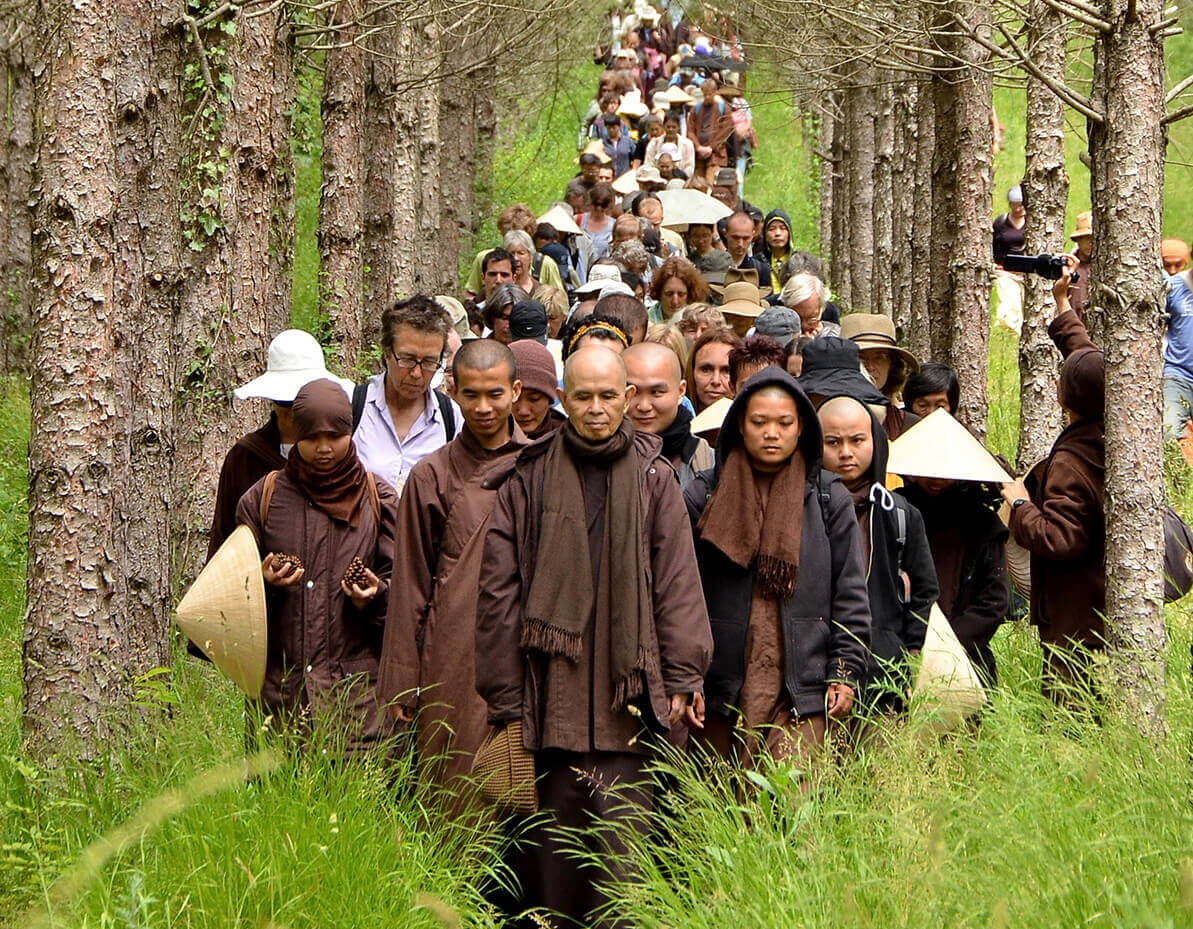Heaven isn’t up there, it’s here. A writer reflects on the spiritual connections between ourselves, our conduct, and our planet in climate crisis, during a visit to Plum Village.
By June Mitchell
Originally published in Resurgence & Ecologist
Recently I attended Earth Week at Plum Village in South West France. The community was established in 1982 by Thich Nhat Hanh, a scientist, peace activist, writer, poet, calligrapher and monk from central Vietnam. This was an appropriate place for Earth Week among the fertile hills between the Dordogne and Garonne rivers where asparagus, plums, apples, grapes, sunflowers and corn flourish in abundance. Like many of us, the Plum Village community, being about 200 monks and nuns plus laypeople, has been asking itself how it might become more engaged at a time of climate crisis. For Earth Week the community invited Extinction Rebellion, eco-villagers, school strikers, Transition towners, and a member of an Indigenous community from North America.

Thich Nhat Hanh is known globally for his teachings on peace and forgiveness: that we can make reparation for the violence in our past by a solid commitment to acts of kindness and compassion to people and planet now. His book Love Letter to the Earth is his passionate call to develop an intimate relationship with the source of all life. Thich Nhat Hanh’s name means ‘one action’, and the action he chose was peace, but he is equally known for his teaching on interbeing: that we are all related; we have come from the cosmos and the cosmos is inside us; we are interdependent and we are not and cannot be separate from the moon, the sun, the stars, the Earth and all beings animate and inanimate. We inter-are with all Nature. We are waves on the sea of existence.
Thich Nhat Hanh has described the process of meditation as being like a cloudy glass of apple juice, which settles and becomes attractive to drink after about 20 minutes if you leave it undisturbed. We need to be like apple juice and still ourselves before we launch into action. Meditation is practised while sitting, walking, eating and working. It became clear to me during Earth Week that the practice of silence, deep relaxation, singing and playing was having a transformative effect on me and others. We were discovering the truth of Thich Nhat Hanh’s teaching: that we need inner peace if we wish to make peace in the world; we need inner harmony if we wish to harmonise with others; we need to practise loving kindness if we want others to be kind. The outer and inner are inextricably connected.
For many years the community has been attempting to follow the ideal of ‘reduce, reuse, recycle’, adopting a once-a-week No Car Day, an evening of no electricity in the summer, and an all-vegan diet. Members of the community have always been keen gardeners growing vegetables, herbs and flowers and planting thousands of plum trees, and in the past few years Happy Farms have been established, where permaculture, agro-ecology and organic methods of growing are practised and experimented with. All visitors are asked to participate in community service, including working the land as a spiritual experience. For Plum Village, laborare est orare (‘to work is to pray’).
The teachings of Thich Nhat Hanh are encapsulated in two simple sentences: “I have arrived. I am home.” Through these two sentences members of the community meditate on contentment and living fully in the here and now. One of the great contributions of Plum Village is to inspire Buddhists and non-Buddhists alike to be engaged in caring and compassion for people and planet while nourishing the spiritual life in themselves and others.
June Mitchell teaches Qi Gong and meditation at Schumacher College. To visit Plum Village, go to www.plumvillage.org
The Resurgence Trust is a British educational charity and was established in 2006 to further the educational work of Resurgence magazine. Read more Resurgence & Ecologist articles here.